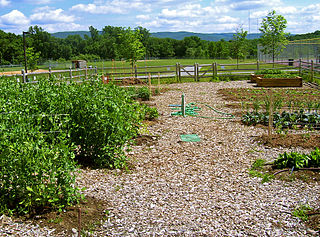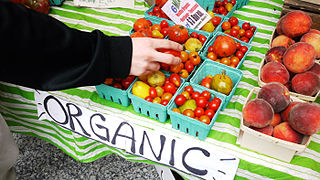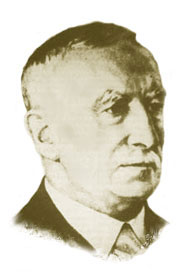Organic farming, also known as organic agriculture or ecological farming or biological farming, is an agricultural system that emphasizes the use of naturally occurring, non-synthetic inputs such as compost manure, green manure, and bone meal and places emphasis on techniques such as crop rotation, companion planting, and mixed cropping. Biological pest control methods such as the fostering of insect predators are also encouraged. Organic agriculture can be defined as "an integrated farming system that strives for sustainability, the enhancement of soil fertility and biological diversity while, with rare exceptions, prohibiting synthetic pesticides, antibiotics, synthetic fertilizers, genetically modified organisms, and growth hormones". It originated early in the 20th century in reaction to rapidly changing farming practices. Certified organic agriculture today accounts for 70 million hectares globally, with over half of that total in Australia.

The following outline is provided as an overview of and topical guide to organic gardening and farming:
Vegan organicagriculture is the organic production of food and other crops with minimal animal inputs. Vegan organic agriculture is the organic form of animal-free agriculture.

The organic movement broadly refers to the organizations and individuals involved worldwide in the promotion of organic food and other organic products. It started during the first half of the 20th century, when modern large-scale agricultural practices began to appear.

Organic certification is a certification process for producers of organic food and other organic agricultural products. In general, any business directly involved in food production can be certified, including seed suppliers, farmers, food processors, retailers and restaurants. A lesser known counterpart is certification for organic textiles that includes certification of textile products made from organically grown fibres.

The Soil Association is a British registered charity focused on the effect of agriculture on the environment. It was established in 1946. Their activities include campaigning for local purchasing, public education on nutrition and certification of organic foods, and against intensive farming.

Lady Evelyn Barbara Balfour, was a British farmer, educator, organic farming pioneer, and a founding figure in the organic movement. She was one of the first women to study agriculture at an English university, graduating from the institution now known as the University of Reading.

Sir Albert Howard was an English botanist. His academic background might have been botany. While working in India he was generally considered a pathologist; this more than likely being the reason for his consistent observations of the value of compost applications being an increase in health. Howard was the first Westerner to document and publish the Indian techniques of sustainable agriculture. After spending considerable time learning from Indian peasants and the pests present in their soil, he called these two his professors. He was a principal figure in the early organic movement. He is considered by many in the English-speaking world to have been, along with Eve Balfour, one of the key advocates of ancient Indian techniques of organic agriculture.
Biodynamic agriculture is a form of alternative agriculture based on pseudo-scientific and esoteric concepts initially developed in 1924 by Rudolf Steiner (1861–1925). It was the first of the organic farming movements. It treats soil fertility, plant growth, and livestock care as ecologically interrelated tasks, emphasizing spiritual and mystical perspectives.

The Biodynamic Federation Demeter International is the largest certification organization for biodynamic agriculture. Its name is a reference to Demeter, the Greek goddess of grain and fertility. It is a non-profit umbrella organisation with 46 members organisations in 36 countries, and over participating 6,500 farmers around the world, representing both the global biodynamic movement and the Demeter certified biodynamic farms. The organization incorporates 19 certifying Demeter organizations, and the rest of the certification is done by the international certification committee.
Traditional farming was the original type of agriculture, and has been practiced for thousands of years. All traditional farming is now considered to be "organic farming" although at the time there were no known inorganic methods. For example, forest gardening, a fully organic food production system which dates from prehistoric times, is thought to be the world's oldest and most resilient agroecosystem. The industrial revolution introduced inorganic methods, most of which were not well developed and had serious side effects. An organic movement began in the 1940s as a reaction to agriculture's growing reliance on synthetic fertilizers and pesticides. The history of this modern revival of organic farming dates back to the first half of the 20th century at a time when there was a growing reliance on these new synthetic, non-organic methods.
The Cawthron Institute is New Zealand's largest independent science organisation, specialising in science that supports the environment and development within primary industries. Cawthron has its main facilities in Nelson. It works with regional councils, government departments, major industries, private companies, and other research organisations throughout New Zealand and around the world. Cawthron employs approximately 300 scientists, laboratory technicians, researchers and specialist staff from 26 countries. It has both chemistry and microbiology labs, and has a major focus on food related testing for food safety and export certification. Cawthron holds IANZ accreditation for a wide range of tests. Its scientists include experts in aquaculture, marine and freshwater resources, food safety and quality, algal technologies, biosecurity and analytical testing.

Organic food, ecological food, or biological food are foods and drinks produced by methods complying with the standards of organic farming. Standards vary worldwide, but organic farming features practices that cycle resources, promote ecological balance, and conserve biodiversity. Organizations regulating organic products may restrict the use of certain pesticides and fertilizers in the farming methods used to produce such products. Organic foods are typically not processed using irradiation, industrial solvents, or synthetic food additives.

Agriculture in the United Kingdom uses 70% of the country's land area, employs 1% of its workforce and contributes 0.5% of its gross value added. The UK currently produces about 54% of its domestic food consumption.
Animal-free agriculture, also known as plant agriculture, plant-based agriculture, veganic agriculture, stockfree farming, plant farming or veganic farming, consists of farming methods that do not use animals or animal products.
The Australian Organic Farming and Gardening Society (1944–1955) was founded in Sydney on 5 October 1944, during the closing months of World War II. It came into being two years before the United Kingdom's Soil Association, thus becoming the first agriculture organisation in the world to call itself an "organic" association.
The environmental impact of agriculture is the effect that different farming practices have on the ecosystems around them, and how those effects can be traced back to those practices. The environmental impact of agriculture varies widely based on practices employed by farmers and by the scale of practice. Farming communities that try to reduce environmental impacts through modifying their practices will adopt sustainable agriculture practices. The negative impact of agriculture is an old issue that remains a concern even as experts design innovative means to reduce destruction and enhance eco-efficiency. Animal agriculture practices tend to be more environmentally destructive than agricultural practices focused on fruits, vegetables and other biomass. The emissions of ammonia from cattle waste continue to raise concerns over environmental pollution.
Soil management is the application of operations, practices, and treatments to protect soil and enhance its performance. It includes soil conservation, soil amendment, and optimal soil health. In agriculture, some amount of soil management is needed both in nonorganic and organic types to prevent agricultural land from becoming poorly productive over decades. Organic farming in particular emphasizes optimal soil management, because it uses soil health as the exclusive or nearly exclusive source of its fertilization and pest control.

Organic farming in New Zealand began in the 1930s and became more popular in the 1980s. It has gained importance within the farming market, particularly with the recent involvement of larger companies, such as Wattie's.

Regenerative agriculture is a conservation and rehabilitation approach to food and farming systems. It focuses on topsoil regeneration, increasing biodiversity, improving the water cycle, enhancing ecosystem services, supporting biosequestration, increasing resilience to climate change, and strengthening the health and vitality of farm soil.










